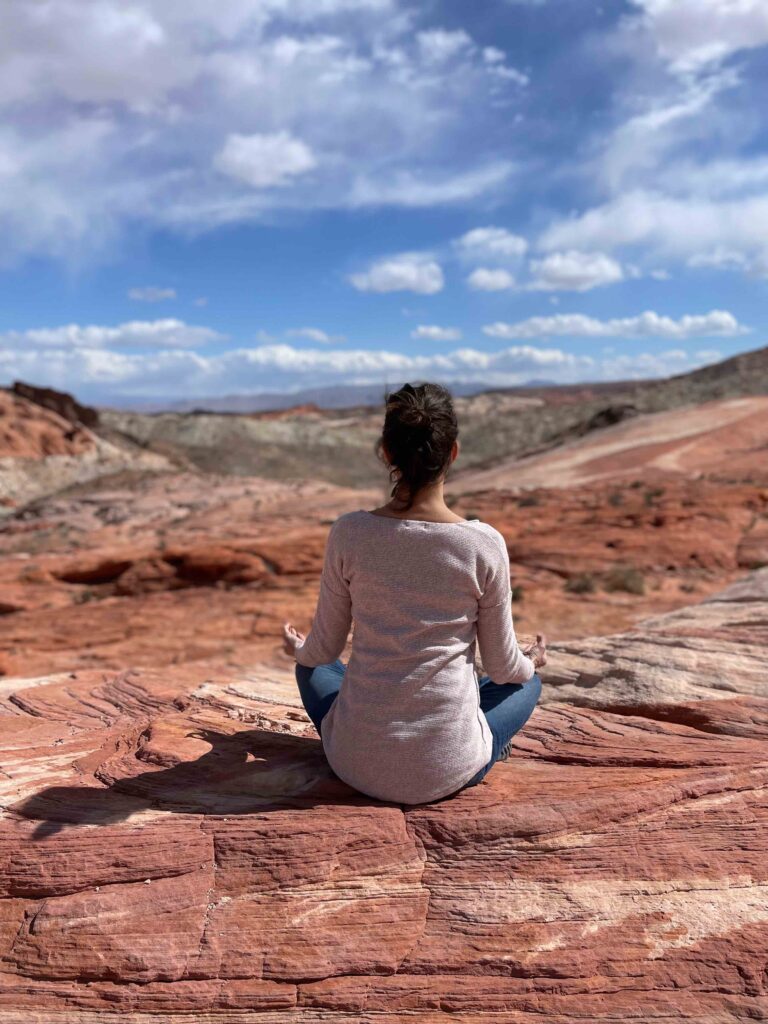For years I have identified myself as a yoga teacher. Whether I’m in line at the grocery, taking a walk outside, or in a social environment where I meet someone new, inevitably the question “What kind of work do you do?” is asked. And I have replied, “I am a yoga teacher.” Probably hundreds of times, I am met with these responses or of the like:
I’m not flexible enough for yoga.
I can’t touch my toes.
My body is too tight for yoga.
People have already decided they cannot practice yoga based on what our culture has told us what yoga is—a physical, acrobatic practice for thin, flexible, white-bodied women. All you have to do is google yoga and you’re inundated with images of postures, such as handstands and putting your leg behind your head. And, when speaking with someone in a short exchange it is difficult to break through the belief or confusion that yoga is only asana, the postures—and challenging postures at that. How do we convey that there is a much bigger picture to yoga?
After my last exchange of meeting someone new and hearing the similar objections as a response to the work I do in the world, I thought, there has got to be a different way to share “I am a yoga teacher.”
I recently went to an optometrist for an eye exam. She called my name and directed me to her office. We made “small talk.” She asked if I was there in the middle of my workday. I replied “No, today is technically a free day for me, but it usually gets filled with a list of things to do.” She said, “I know all about free days. You think you have a day off only to make yourself busier than a typical workday.” And then the question came, “What do you do for a living?” I paused and said, “I teach meditation and slowing down.” We both laughed. She said, “how ironic.” I shook my head in agreement and we continued to connect.
This encounter led to a conversation of how we glorify being busy and the sense of guilt that is felt when we slow down—when we wait to respond to that text, email, phone call or whatever it may be. Like our worth is based on our ability to be productive and respond right away to any given situation or circumstance and if we do not, we are not valued or seen as important.
We talked about the importance of rest and pause, even if it is just for a moment—how stress, anxiety, and daily traumas we experience accumulate and compile. And we unconsciously use busy-ness to not deal with our stuff and our mental and physical health deteriorates. Here I am, getting an eye exam and having one of the deepest conversations I’ve had with someone I just met in quite some time.
This woman shared a story with me from her childhood growing up in Africa and her move to the US at age 19 and how she was immediately indoctrinated into this fast-paced, competitive, producing-driven mentality. When she went home after being in the US for years it was a challenging adjustment and she even felt herself judging the slow pace of her relatives and friends. It took some time to “return home,” to slow down, and to simply be present and that was an awakening for her. She said it used to be an adjustment for her to go home to Africa and now, the big adjustment is coming back to the US.
It’s not easy to slow down in this culture. There is a deep sense of guilt and not feeling valued that comes with taking a pause. But the pause is essential, slowing down is necessary, and if we are to live more balanced, connected, and joyful lives, it is necessary to create space for stillness.
When we are still, we allow for the stuff we carry, the heaviness of this life to arise within us, to assimilate, and to heal. Stillness is not easy and healing is an ongoing practice that requires us to slow down.
I am not able to solve the world’s problems. I acknowledge that slowing down is a privilege and not accessible to all. Not everyone has the opportunity to pause. Many are getting by each day working three jobs or just simply trying to survive. It’s a gift to be able to take time to practice stillness, meditation, yoga.
I share this as a reminder of the power of stillness—and a reminder that yoga is not only asana. Yoga as asana is a colonized lens of what the practice is, which makes it even more inaccessible. Anyone and everyone may practice yoga. All you have to do is pause and breathe.
So, yes, I am a yoga teacher, but more so I am a human, living in a beautiful, chaotic, and violent world practicing moments of calm and peace and doing my best to share that with others in an authentic, compassionate, and accessible way.
Anna Ferguson is the author of World Peace Yoga: Yoga for People Who Breathe, a book on yoga that inspires peace in action, developing intuition, deepening empathy, and expanding compassion. Connect with Anna at World Peace Yoga in Cincinnati and via Instagram @annafergusonpeace or via Facebook or join her for a class online at worldpeaceyogaonline.com.

